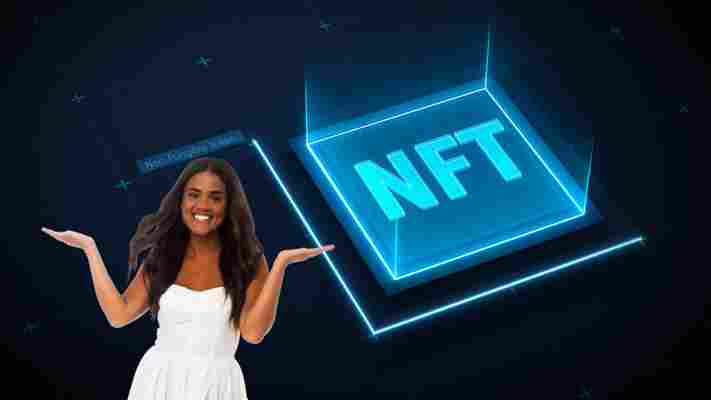NFT’s or non-fungible tokens first captured the public imagination when a digital collage by an artist named Beeple sold for US$69 million (£51 million) at Christie’s in March 2021. Since then, there has been an explosion in the use of these units for storing digital content, which are bought and sold using online ledgers known a blockchains.

Since that initial connection with art, we are seeing NFT’s being used in numerous other ways. Notably, many are being traded as collectibles on exchanges like OpenSea and Rarible . Lately, for example, a series of 8,888 adorable “ Pudgy Penguins ” made a splash, each reflecting its own unique characteristic, with one selling for a record 150 ethereum (about US$500,000).
Yet whether it is a remarkable piece of digital artwork or a cute digital penguin, NFTs are essentially tradeable jpegs or gifs. Unlike physical collectibles, a NFT owner will not be able to display the asset in their home – except on a screen. They might think they could display it on a website, but this isn’t necessarily the case. So what is someone actually getting when they buy an NFT, and what do they truly own from a legal perspective?
The new frontier
To understand NFTs, it is important to understand what is meant by “fungible”. Fungible is derived from the Latin verb fungi , meaning to perform. In the broader context, this means interchangeable and relates to whether something can be exchanged.
Money is fungible, in the sense that you can buy a commodity worth £10 with any £10 note; it doesn’t matter which one you use. On the other hand, NFTs cannot be exchanged like for like with another. They are each one of a kind or one of a limited edition.
Content sold as NFTs can be created in many ways. It can be computer-generated, which was the basis for the production of 10,000 unique CryptoPunks in 2017.
It can reflect a collaborative work, such as the English singer-songwriter Imogen Heap’s series of music NFTs, “Firsts” . These involved her improvising alongside visuals provided by artist Andy Carne. Or NFTs can represent a single work, such as Beeple’s artwork; or a series of items, such as the Kings of Leon’s “NFT Yourself” series in which the assets on offer included music albums with unique features and special concert tickets.
Limited rights
NFTs allow the owner of a limited work or collection to reach their audience directly. Whereas previously it was not possible to sell something like the first ever tweet , or a taco-themed gif , or indeed a piece of art online, now individuals, companies, or cultural organizations can do so as long as they are the rightful owner.
The creator can do this because, according to UK copyright law , copyright arises automatically when a work is created – as long as it reflects the “author’s own intellectual creation”. This means that the creator of a work is the owner of the copyright, and can do what they want with it.
When someone buys an NFT from the creator, they obtain ownership in the sense that it becomes their property. After all, an NFT is a digital certificate of ownership representing the purchase of a digital asset, traceable on the blockchain.
But the NFT holder does not have any other rights to the work. This includes those offered under copyright law, such as the right of communication to the public (in other words, making the asset available to the world at large), or the rights of adaptation or reproduction.
The situation is the same if you buy a physical collectible. Owning a painting does not automatically give you the right to display it in public. It also doesn’t give you the right to sue for infringement of copyright if someone reproduces the image in the painting without permission. To obtain such rights, you either need to be the copyright owner of the work or have the copyright assigned to you by the creator (in writing and signed).
The trouble with online content is that, by virtue of its digital nature, it is easy to share, copy and reproduce. Buyers of NFTs need to understand that they would be infringing the copyright if they engage in such activities without the permission of the right holder. The only way such rights can be transferred is through the terms embedded in the NFT, in the form of a license.
There have been some NFTs where the buyer has been granted the right to use the copyright in a limited way. For example, owners of CryptoKitties NFTs have been allowed to make up to US$100,000 in gross revenues from them each year. In other cases, creators have specifically restricted all commercial use of the work. For example, the Kings of Leon stipulated that their NFT music was for personal consumption only.
Buyers, therefore, need to be clear that the main reasons to buy an NFT are the speculative investment and the pleasure of having something unique from an admired artist, brand, sports team, or whatever. Unless the terms allow it, buyers will only have a limited ability to share the creative work on public platforms or to reproduce it and make it available for others.
Incidentally, buyers should also be aware that the blockchain cannot absolutely know whether a creative work is authentic . Someone can take another person’s work and tokenize it as an NFT, thereby infringing the rights of the copyright owner. You need to be sure that you are buying something that originated from the creator.
In short, NFTs are probably here to stay, but they clearly raise ownership questions relating to copyright law. This may not be immediately clear to most people, and it’s important that you understand the limits of what you are getting for your money.
Article by Dinusha Mendis , Professor of Intellectual Property and Innovation Law and Acting Deputy Dean (Research), Faculty of Media and Communication, Bournemouth University
This article is republished from The Conversation under a Creative Commons license. Read the original article .
Twitter’s accepting tips in Ethereum — and Dorsey must be fuming
Last night, Twitter announced it’ll allow users to tip accounts via Ethereum .

This is the social network’s second crypto announcement in two months, after it enabled NFT-based profile pictures in January.
These developments have come after Jack Dorsey stepped down as the company’s CEO last year .
As a staunch Bitcoin supporter, Twitter’s new direction in cryptocurrencies might have annoyed him — especially as both announcements are related to Ethereum, a currency he appears dismissive of.
When considering all this, we had one important question : just how annoyed will Jack Dorsey be?
To find out, we explored his connection with digital currencies over the years.
Dorsey’s love for Bitcoin (is in his bio)
The Twitter co-founder has been public about his ‘loyalty’ towards Bitcoin . He’s been experimenting with the digital currency at his payment startup Square for some time now.
In a 2019 interview with TNW, Dorsey outlined a need for “a native internet currency. ” At that time, he wanted Square to take an active part in developing the cryptocurrency ecosystem.


Last year, days after his departure from Twitter, he renamed Square to Block , hinting that its future would be tied in with blockchain technologies. The firm’s digital currency department working on Bitcoin — Square Crypto — was renamed Spiral.
During this time, Ethereum had assumed a favored position in the crypto world because of its ability to support apps built on the blockchain. Its supporters think of it as a superior technology to Bitcoin, which mostly just acts as a currency.
Jack vs. everyone (or web3)
Both these worlds collided when Dorsey openly criticized web3 last December, calling it a VC-controlled world.
He also made a dig at venture firm a16z . It has invested in mega web3 companies, including NFT marketplaces and projects like Opensea, Cryptokitties, and NBA Top Shot, as well as decentralized exchanges like Coinbase, Uniswap, and Coinswitch Kuber.
Notably, many of these projects are based on Ethereum.
So the community accused Dorsey of hating the decentralized protocol. While he cleared the air by saying he’s not “anti-ETH,” his tweets suggest otherwise.
This wasn’t the first time the Ethereum community had called out Dorsey. Last August, he posted about the Twitter-list app Vicariously , but the screenshot had a tweet from a Bitcoin supporter bashing Ethereum.
Minutes later, the Twitter co-founder fueled the fire with a tweet saying “There are no coincidences,” hinting that the screenshot was intentional.
Making a mark in the cryptocurrency world
Despite registering $1.81 billion in Bitcoin revenue (with a $42 million net profit) in Q3 2021 alone, Square isn’t the poster child of cryptocurrency finance it wants to be.
That, however, hasn’t stopped Dorsey from pushing his favorite digital currency.
Last month, he created a legal defense fund for Bitcoin developers . At the same time, Block announced it’s building an ‘open Bitcoin mining system’ .
One of his biggest projects to date was announcing TBD last August , a division of Block that works on Bitcoin-based Decentralized exchange (DeX). It will supposedly allow developers to run solutions based on this protocol.
In response, Ethereum’s co-founder, Vitalik Buterin, expressed his doubts about the feasibility of the project.
A crying shame
When Dorsey was leading Twitter, the only notable cryptocurrency decision was to include Bitcoin as a payment medium for creator tips .
The Ethereum-related announcements over the past two months under new CEO, Parag Agrawal, show a clear divergence from this strategy.
And it makes perfect sense. Twitter should be tapping into hot cryptocurrency trends and trying to evolve. Change is vital if you want engaged users.
So, to answer our original question — would Dorsey be angry at the company he led twice for its support of Ethereum? Probably.
It’s tough to say for sure, but, from all the above, it seems clear he’d be at least a bit annoyed with Twitter’s new “web3-direction.”
It’s okay, Jack. Maybe another meditation retreat will help you get over it.
Dutch university pays $220K in Bitcoin to alleged Russian hackers
A Dutch university resorted to paying hackers $220,000 in Bitcoin to release computer systems held for ransom since Christmas Eve, reports Reuters.

University of Maastricht vice president Nick Bos announced at a press conference on Wednesday it had bowed to the cyberattackers’ demands, as it otherwise would’ve had to rebuild its entire IT network to get back online.
“The damage of that to the work of the students, scientists, staff, as well as the continuity of the institution, can scarcely be conceived,” said university vice president Nick Bos, as quoted by Reuters.
Bos confirmed the attackers gained entry to the network after compromising an employee’s email account in November 2019 via phishing.
By December 24 last year, the hackers had encrypted the university‘s computer systems, including workstations and email servers, and demanded 30 BTC for a tool to unlock them (worth $216,000 then, $294,000 today).
Cybersecurity firm Fox-IT, hired by the University of Maastricht to recover its systems, found Russian-speaking cybercriminal group TA505, also known as Evil Corp, responsible for the attack.
The US Department of Justice believes TA505 has caused over $100 million worth of losses since its inception, having hit financial institutions and retailers in several countries with its information-stealing Dridex malware.
A recent investigation found more than 1,000 potential TA505 victims across the world.
FBI urges victims not to pay Bitcoin ransoms
Ransomware incidents like these persist across the world. In the past two years, hackers have taken over the computer networks of governments , businesses , hospitals , and schools, often demanding millions of dollars in cryptocurrency (most Bitcoin) for a decryption tool.
They’re indeed so prevalent that the FBI issued a warning in October urging ransomware victims not to pay their hackers, lest they be encouraged to carry out more attacks.
As for the University of Maastricht, its computer systems are reportedly back online and now fully operational.











